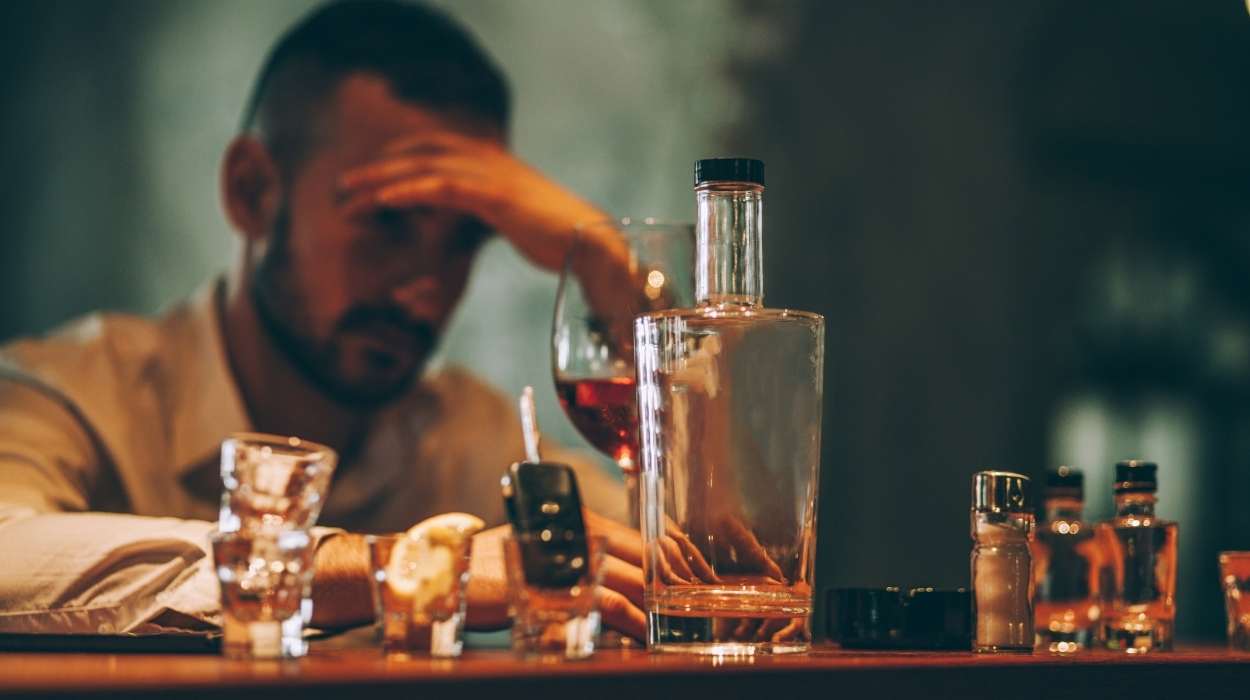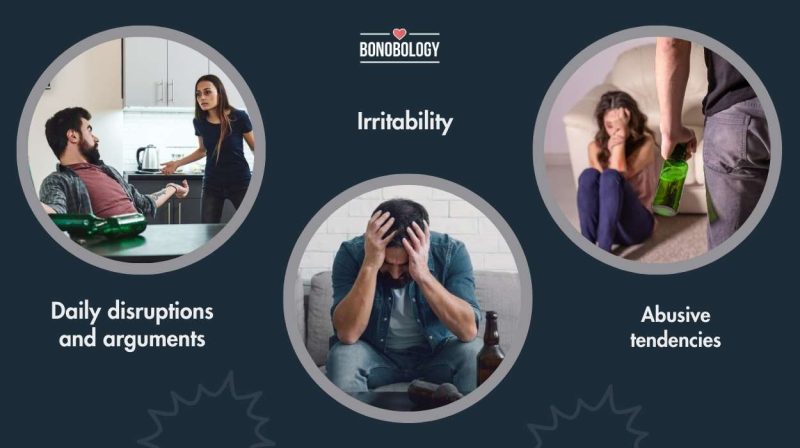Have you ever found yourself wondering if you’re dating an alcoholic? This requires your immediate attention because being in love with an alcoholic can wreak havoc on your mental well-being as well as put you at the risk of violence and physical or sexual abuse.
With that said, enjoying an occasional drink or even binge drinking with friends once in a while to unwind or celebrate does not qualify as alcoholism. To be able to tackle this problem, you must first learn to spot the red flags. Next comes the arduous task of taking corrective measures. Neither is easy.
So, is it okay to date an alcoholic? Should you leave your partner if you find out they’re alcoholic or be with them to help them heal? Have they taken to alcohol because they’re going through a hard time? How can support groups help? We’ll try and answer such burning questions that you may find yourself grappling with. So, read on.
What Classifies A Person As An Alcoholic?
Table of Contents
Alcoholism is a condition defined by a person’s overwhelming physical need or desire to consume alcohol, even at the detriment of their health or ability to lead a normal life. Traditionally, people suffering from this condition were referred to as alcoholics. However owing to the stigma attached to this term, medical professionals now use the term Alcohol Use Disorder (AUD).
The National Institute on Alcohol Abuse and Alcoholism defines alcoholism or AUD as “problem drinking that becomes severe”. To put it simply, an alcoholic does not know how and when to stop drinking. This condition is progressive. Over time, the affected person’s entire life begins to revolve around alcohol and addiction starts taking a toll on their entire being.
They spend a major chunk of their time either trying to get their next fix, consuming alcohol or recovering from the after-effects of excessive drinking. This can interfere with a person’s ability to lead a normal life. This begins to trigger problems in their personal and professional life, coupled with financial woes.
Related Reading: In Love With An Alcoholic? 8 Things You Need To Know
Alcoholism vs alcohol dependence
So, your boyfriend drinks every day? Does he also turn abusive when he doesn’t get alcohol? And do you keep wondering, “Does he have a drinking problem?” Do you find yourself being emotionally blackmailed to buy your girlfriend alcohol? Does she throw a fit if she doesn’t get her daily dose of booze? Well, it is vital to note that alcoholism and alcohol dependence are different concepts. Let’s see what’s the difference between a heavy drinker and an alcoholic:
- Dependence on alcohol refers to consuming alcohol regularly, albeit in moderation and a controlled manner.
- Dependence on alcohol doesn’t have any harmful physical or psychological effects and may help people to manage stress
- However, people with alcohol dependence can develop alcoholism in the long run, if they don’t regulate their drinking patterns
- Alcoholism has severe negative effects, such as domestic violence and physiological issues. Even getting de-addicted can bring in withdrawal symptoms
So, the next time you crib to your best friend, “My boyfriend has a drinking problem. Should I leave him?” or “My girlfriend can’t live without alcohol,” try and find out if your boyfriend or girlfriend is indeed an alcoholic or is just suffering from a little alcohol dependence.
Related Reading: 11 Warning Signs Of A Toxic Relationship
Dating a person with an unhealthy relationship with alcohol can have a negative effect on your mental health too. As you’ll find out in this article, alcoholism can cause harm to both alcoholics and to the people around them. It may well lead to a toxic relationship, which is why signs you’re dating an alcoholic are so important to take note of.
Are You Dating An Alcoholic? – 10 Signs That Say So
Alcoholism is a rampant problem globally. According to the National Institute of Health data, 14.4 million adults in America struggle with this condition. WHO reports that 3.3 million people die due to alcohol abuse globally every year. So, the odds that one would end up being with an alcoholic are substantial.
The first step is to diagnose the problem. Only then can you work on fixing it. Since alcoholism is a progressive condition, you should know the answer to “When is drinking a problem in a relationship?” Sometimes, even the partners themselves may hide their SO’s alcohol problems. If you’re concerned and thinking “My boyfriend won’t stop drinking. What should I do?,” try to notice the signs of alcoholism first.
So, here are 10 key signs you’re dating an alcoholic:
1. All their plans involve drinking
One of the first signs of an alcoholic is that all their plans and social activities involve drinking. Let’s not confuse them with people who would like to down a few drinks at a birthday celebration or at an evening out with friends.

What separates this from alcohol addiction is that an alcoholic’s social life doesn’t have much beyond alcohol. For instance:
- They might bring beer cans on a hike, a sporting event, or a pottery class
- They may have a hip flask tucked in their jacket or coat for easy access
- They may disappear for a few minutes from social events or family get-togethers and return smelling of vodka. This is one of the signs of a closet alcoholic
Related Reading: My Abusive Wife Beat Me Up Regularly But I Fled Home And Found A New Life
But are you dating a functioning alcoholic? Well, the term is used to describe someone who goes through daily activities normally but is addicted to alcohol in private. Such people manage to hide their symptoms well.
2. Irritability
If your partner becomes irritable and frustrated at the prospect of not being able to drink, it’s a classic sign that you’re dating an alcoholic. In some cases, this may even trigger angry outbursts or make you see a dark side to them that you didn’t even know existed.
- They may lash out at their loved ones for planning to spend a weekend at a place where alcohol isn’t easily accessible
- They may be enraged when sober
3. Drinking every day is non-negotiable
A person affected by alcoholism cannot survive without their daily fix. Come rain or sunshine, they need a bottle by their side. In such cases, you’ll find them:
- Taking a couple of swigs even before breakfast
- Downing a few drinks alone to avoid drawing attention and scrutiny
Related Reading: Turning Point: I Dealt With My Husband’s Drug Addiction by Loving Him Unconditionally
4. Using alcohol as a crutch
People often use alcohol as a coping mechanism when they have a hard time. A vast majority of alcoholics start drinking excessively to deal with stress or numb their feelings. The buzz becomes their escape from the stark realities of life. Before they know it, they’re hooked. In such cases, they use alcohol to deal with:
- Work stress
- Family problems
- Trauma from past relationships
- Anger
- Sadness
- Loneliness
- Success and happiness
Simply put, be it the highest highs or the lowest lows, they cannot navigate the twists and turns of life without alcohol.
5. Change in personality
You may have noticed that your partner’s personality changes drastically when they’re drunk. Many alcoholics drink to feel ‘normal’, implying that they only feel normal when they’re drunk.
Related Reading: Why Do Women Stay In Abusive Relationships?
We often find women complaining, “My boyfriend turns into a different person when he drinks.” The subtle changes like being more outspoken and laughing a bit more are all common, but if you see a complete shift in their personality as if they were waiting to get drunk to truly be themselves, it’s a huge cause for concern. Look out for these signs:
- If you’re dating an alcoholic woman, she may show a complete change in her demeanor, as though she was held back before
- A man may get more aggressive and indulge in domestic violence or display anger issues if he is an alcoholic
6. Disruptions in daily life
Alcohol addiction can begin to interfere with the affected person’s day-to-day life, resulting in disturbances and disruptions. Some instances of such disruptions are:
- Getting into a fight at a bar
- Missing a flight
- Skipping an important presentation at work

Your partner may brush these incidents off as a one-time thing. If you pay attention, you’ll begin to see a pattern. Moreover, everything else takes a backseat, be it work, family members, friends, loved ones, or romantic relationships. This might make you wonder, “Do alcoholics regret losing you?” Well, they might but they don’t have control over this addiction.
7. Abusive tendencies
Assessing whether you’re dating an alcoholic or not can become even more difficult if the person is a high-functioning alcoholic. Such people can maintain relationships and pursue successful careers even despite a drinking problem.
Related Reading: Making Peace With Your Past – 13 Wise Tips
They may even possess some disarming qualities like an inherent charm, intelligence, and wit, which may distract you from focusing on some of the more troubling aspects of their personalities.
This may include a tendency to get violent or abusive either under the influence of alcohol or lack of it. If your partner’s mood swings and irritability triggered by alcohol have led to nasty fights, something is definitely out of place. Worse still, if you have been at the receiving end of abuse or violence because of alcohol, it’s a clear indicator that you’re dating an alcoholic.
8. Financial troubles
One of the signs that someone is becoming an alcoholic is that they will have financial issues. Have you noticed any of these signs?
- Your partner is always too broke to participate in activities with you, be it a fancy dinner, a trip, or an adventure sport. Their money issues are never resolved, and the answer is always, “Money is a little tight right now, let’s do it another time.”
- You either have to cancel your plans or pay for them
- Your partner doesn’t pay for household expenses
- When it comes to sourcing that bottle, they always find the money for it
- Drinking is their sole ‘source of entertainment’
- They will jump at the prospect of binge drinking and will also offer to foot the entire bill
Addiction of any kind is expensive. And if you find your partner splurging on alcohol and
avoiding paying for shared activities or household expenses, your SO may be an alcoholic.
9. Their whereabouts are a mystery to you
As a person’s reliance on alcohol increases, their tolerance for it and their level of consumption also continue to increase. In such cases, they may start spending more and more time away from you. They may also have a circle of friends, who are also addicts, that you know nothing about.
When questioned about their whereabouts, your partner may do any of these:
- Dismiss your concerns
- Blame you for being paranoid
- Get all worked up about your ‘interference’ in their life and throw temper tantrums
- Lie continuously
10. Physiological problems
Health and physical problems will be more apparent in alcoholics. Moreover, studies say women face a higher risk of health problems when they drink alcohol. The long-term risks of alcohol abuse include:
- Permanent kidney damage
- Liver damage
- Increased risk of heart disease
- Brain damage
Related Reading: 8 Ways You Can Help Your Partner Get Over Drug Addiction
These may manifest in symptoms such as:
- Pale skin
- Dehydrating effects, such as brittle nails and hair
- Sluggish behavior
- Irritability
- Weight loss
- Broken capillaries on the face, typically around the nose
- Yellowish tinge in the eyes or on the skin
- Sudden or speedy onset of signs of aging, such as wrinkles
- Frequent alcohol breath
What Can You Do If You’re Dating An Alcoholic?
We often come across people cribbing, “My boyfriend has a drinking problem. Should I leave him?” Well, being in a relationship or marriage with an alcoholic is not easy. The excessive drinking, your concern for their well-being, the lying, the tension, and the fights can get too overwhelming for anyone.
So, what can you do if you’re dating an alcoholic? Can you have a healthy relationship with an alcoholic? Here are 5 ways to handle this situation:
1. Stage an intervention
This is an important first step if your partner is in denial about their drinking problem. However, it is imperative that this intervention comes across as a loving act and not as a way of shaming them. You can reach out to their family, friends, or co-workers to help your partner see the grim reality, without making them feel humiliated. In fact family therapy is the best thing in such cases.
Related Reading: 13 Signs He Disrespects You And Does Not Deserve You
The correct way to do it is by telling the person how much you love them, sharing heartwarming stories about your association, and then presenting your concerns about their drinking habits. You can say things such as:
● “I love you too much to let you throw away your life like this.”
● “I can’t see you ruin yourself with such self-sabotaging behavior.”
● “We love you, but you can’t just come and crash at our place to get away from your problems. You need to get help.”
As their partner, you too must use this opportunity to let the person know how their addiction has affected you and your relationship.

2. Have a conversation
Once your partner has had the chance to process the intervention, sit down for a serious conversation about the problem. You may be dating a functional alcoholic who does not show obvious signs or isn’t aware of their situation. Point out the signs of too much alcohol consumption that were the red flags leading you to conclude you’re in a relationship with an alcoholic. They may still act defensive or be in denial about it. Here’s what you can do:
- Don’t push them too hard at this point
- Just express your concerns, and let them know you’re coming from a place of love and care. Be their support system
- Point out how their alcohol addiction has impacted your relationship
- Point out the ill-effects of their alcoholism on your mental well-being
- Make sure you communicate when they’re sober. For instance, having the talk after they’ve spent the night out drinking and returned home terribly hungover is pointless
3. Assess if you’re part of the problem
Addiction thrives in a system and you have unwittingly become a part of that system. This is not to say that you are to blame for your partner’s alcohol addiction. Not at all. Even so, it is important to assess if you have in some way enabled their tendencies.
You may have played a part in their alcoholism by:
- Ignoring the signs of excessive much alcohol consumption
- Hiding their drinking habits from family members or friends
- Making excuses for their excessive drinking
- Blaming it on their friends or family members
- Not being vocal about how you feel
- Suffering verbal, physical, or emotional abuse silently
To break the cycle, you need help to be able to help your partner. Consider joining free programs designed specifically for people who have someone with a drinking problem in their life. Parents, spouses, partners, siblings, and relatives of people with addiction come together and share their stories and journeys in such communities.
Related Reading: Tips For Living And Dealing With An Alcoholic Partner
But what is a functioning alcoholic? Well, such a person wouldn’t show visible symptoms of alcoholism in public and may appear to be a healthy and hearty person in social situations. And that’s where you, as a partner who has seen their other side, can help their family, friends, and loved ones identify the signs.
Such support groups can be a tremendous source of positivity, since these people can relate to exactly what you’re going through.
4. Nudge them to get help
Alcoholism or AUD is a medical condition. You can’t just make it go away with will power and strong resolves. Besides, quitting cold turkey can have dangerous consequences for a person used to heavy drinking every day. The symptoms can range from shakes and seizures to hallucinations, and in some extreme cases, even death.
So the detox process must take place under medical supervision or at least guidance of experienced coaches, sponsors or internists. If you’re dating an alcoholic, slowly but surely nudge them to get help to get over their addiction. Here are some of the top options available to you:
- Joining support groups such as Alcoholics Anonymous: Alcoholics Anonymous is one of the most successful resources available for achieving and maintaining sobriety. It is a free, nonprofit fellowship that has groups and meetings all over the world, which means it is easily accessible to people of every background. Their 12-step program, with a sponsor to guide an addict through their recovery and sobriety, is immensely successful and effective
- Work with an addiction therapist: For those who have the means and require a cloak of confidentiality to embark on the journey of sobriety, working with a therapist for addiction recovery is a great option. Once a person stops drinking heavily, all the issues that they have not been dealing with begin to resurface. Besides, once the crutches of alcohol are removed, an addict can start feeling extremely vulnerable. A therapist can help your partner work through these feelings without a relapse
- Going to Rehab: If alcohol abuse has started to take a toll on your partner’ physical and mental health, an in-patient rehab facility is most advisable. Given that addicts get a chance to recover in the care of trained doctors and experienced therapists, this is the most effective option for overcoming addiction. However, not everyone can take 60 or 90 days off from work and focus solely on healing. Those who do have the time, often lack the financial resources for it. But if neither of these is an issue for you, find out a good rehab facility in your vicinity and motivate your partner to check-in
5. Prioritize yourself
There is only so much you can do to help a partner grappling with alcohol addiction. In the end, it is your partner’s will to make a change that counts. Be their support system, but do not brush aside the impact of dating a person struggling with alcohol on your well-being. If the situation is hurting you and you see no hope for improvement, the best thing is to set the right boundaries and focus on yourself. Even dating an alcoholic in recovery can be tough. Here’s what you can do:

- Make sure you have the right kind of support to cope with this situation
- Don’t make your life revolve around your partner, no matter how much you love them
- Address your emotional health and do things that make you happy
- If all you get are empty promises, don’t hesitate to move on
- If your relationship has turned toxic or abusive and your partner resorts to domestic violence, step back. Wondering how to end a relationship with an alcoholic? Well, just don’t engage and distance yourself
Key Pointers
- People with dependence on alcohol can develop alcoholism if they don’t check their alcohol intake
- If you’re dating an alcoholic, you can see certain prominent signs in them, such as irritability, regular drinking, using alcohol to deal with both negative and positive events, abusive tendencies, physiological issues, financial issues, and mysterious whereabouts
- You can address these issues by staging an intervention, initiating conversations about the ill- effects of alcoholism, assessing if you’re part of the problem, nudging them to get help from support groups, and prioritizing yourself and your emotional health
So, now that you know how to recognize alcoholism and are aware of what to do when you’re dating an alcoholic, we hope you aren’t still trying to figure out how to deal with alcoholism in a relationship! We also hope you aren’t wondering, “Is it okay to date an alcoholic?” The key to smoothening a bond with someone who is struggling with alcohol and substance abuse is to be compassionate and communicate openly. Once you have their confidence, you can guide them to a path of recovery, be it through group therapy or couples therapy.
FAQs
Signs you’re dating an alcoholic include your partner drinking alcohol every day, getting irritable when they don’t have access to alcohol, depending on alcohol to make them feel “normal”. Other signs include if all their outings revolve around alcohol, or if they manage to get drunk even at family gatherings that feature no intoxicating drinks.
If drinking is affecting your partner’s physical or mental health, it is a problem that should never be ignored. They may become abusive, irritable, get physically sick or pick unnecessary fights with you. Their drinking addiction may also affect your mental/physical health negatively, which is when it becomes an inexcusable problem that needs to be addressed right away.
Yes, it’s possible to have a good relationship with an alcoholic if they’re willing to accept all the help that’s coming their way. They must aspire to have a better quality of life and not let alcohol addiction define them. If your partner is dedicated to change themselves and you’re dedicated to making the relationship better, you can have a good relationship with an alcoholic.
Your contribution does not constitute a charitable donation. It will allow Bonobology to continue bringing you new and up-to-date information in our pursuit of helping anyone in the world to learn how to do anything.
Ask Our Expert
You must be Logged in to ask a question.

